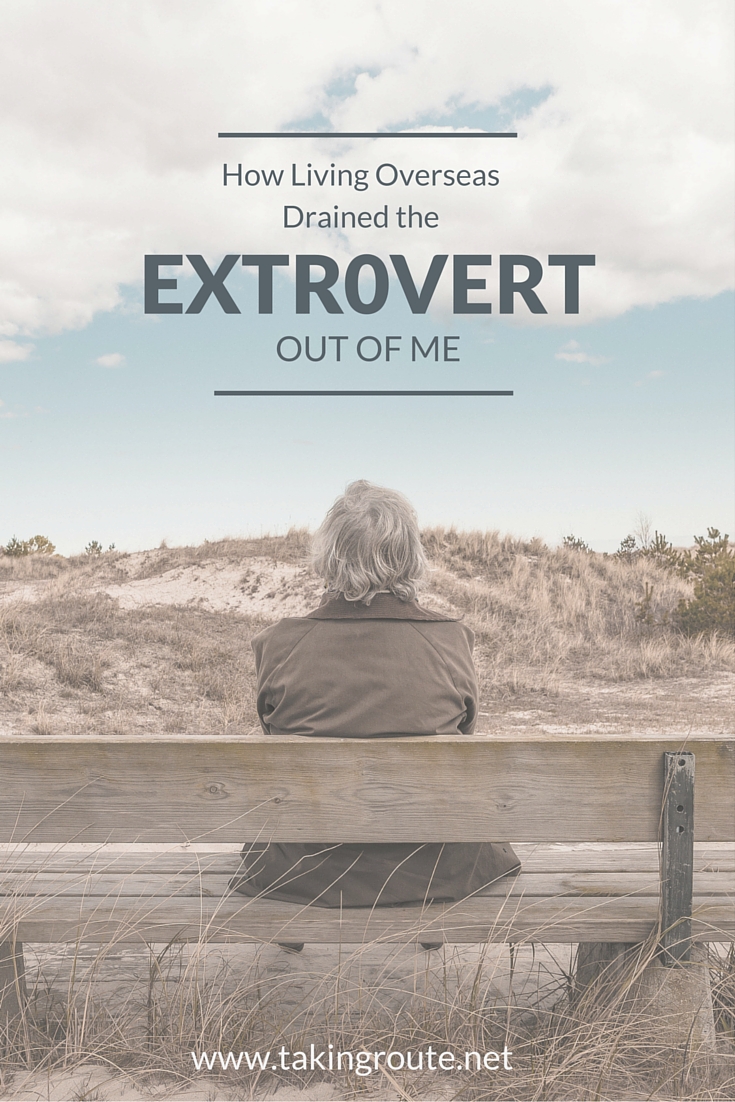How Living Overseas Drained the Extrovert out of Me
Living overseas changes you, though not always in the ways you expect.For example, I knew that in order for me to adapt to life in China, my preference for advanced planning would need to be adjusted. I knew my time-orientation would need to shift towards event-orientation. I would probably even need to tone down my sarcasm and dead-pan comments (still working on that).But, there is one part of my personality that I never dreamed would change: being an extrovert.All my life, I've loved being around people. According to the Myers-Briggs Type Indicator, I had an incredibly high preference for extroversion, but I didn't need an assessment to know I processed my thoughts externally and was energized by being around others. I never got tired of people-people-people.I thought being an extrovert was a permanent part of me, like my height, or my inability to remember phone numbers. So, I naively assumed that living overseas would be great because there would be LOTS OF PEOPLE. A dream come true for an extrovert, right?Wrong.There was no way I would have been able to imagine the sheer number of people who would soon be flowing like a rain-swelled river through my expat life, stretching the limits of what would be enjoyable even for someone like me.Who were all these wonderful folks in my life?First, there were other expats: my classmates, coworkers, and commiserators. Expats are the most transitory people on earth. Not a month went by without somebody moving into or out of our lives, often many somebodies. New relationship after new relationship, then good-bye after good-bye became a hallmark of our time with other foreigners. It made me think of being a summer camp counselor, with a new batch of campers coming in every week or two. Enthusiastic hellos, sad farewells, rinse, repeat.Then, there were the friends and family in the States. Expats often juggle an impressive number of relationships back in their homeland, despite needing to be very present in their host country, too. When our family had the chance to visit the States, we tried to see everyone we could. Our times in the U.S. were a torrent of catch-up conversations, too many dear relationships crammed into too short of a time.Lastly, there was the most obvious group: the locals in our host country. We were building relationships with friends, neighbors, teachers, and more every day. In addition to spending time with these important friends, I had loads more conversations than I normally would while going about daily business. Walking down the street, shopping at the market, playing outside with my kids—activities that involved only the briefest exchange of greetings in my passport country—now involved full conversations with strangers. Each day, I would be peppered with questions from curious onlookers, who were seldom satisfied with a quick answer. There was a whole lotta talkin' goin' on, and it was happening in Mandarin (and sometimes Zhuang, a minority language of China) which made it that much more tiring.At first, this constant flood of relationships was not a problem for extrovert me. I loved having so many people in my life, no matter what location or language the relationships occurred in.But after years of people-people-people, I realized I had more relationships than I could have imagined and more than are probably healthy for one human to sustain. Dream come true, it was not.Something was slowly changing in me. I was starting to feel overwhelmed at times, knowing I could not cram any more partners onto my dance card. More than that, I was needing breaks to get off the dance floor completely.The extroversion was draining out of me. I began to have distinctly introverted thoughts, such as, “I just want to be alone,” or, “I need some cave time.” I started asking my (introverted) husband, “Can you run to the store instead of me? I can't deal with facing people right now.” Once, I shocked myself by saying out loud to a close friend, “I don't even want to consider going to the women's retreat because I will have to meet new people.”What? Was this really me?It was. My preference for extroversion had slowly been worn away, like granite slowly eroded by years and years of rushing water.To be clear, I'm still an extrovert, just less so. Most days, I'm still very happy to be around people-people-people, I still prefer to process things externally, and I am still mostly energized by being around friends. Perhaps, instead of 99% extroverted, I've been drained down to about 85%. Not what it once was. Not who I once was.I'm not the only one to feel a shift like this. I hear expats talk about things changing in them that are deeper than just learning to take off your shoes at the door, or filling the other person's teacup first. Extroverts become more introverted, quiet folks become more talkative in a new language, hardliners become more compassionate, homebodies take a few steps down the spectrum towards “social butterfly.” We all have something we can point to that shows how living in another culture has changed us.Being an expat in China has certainly changed me. Some of the ways were expected, some weren't. And I'm okay with who I've become, even that means I'm no longer a raging extrovert. Now, if you'll excuse me, I need a little cave time.What part of the "ever-present you" has changed to "not so present?" Have you seen a spouse or a child change in personality? How has that affected your relationships at home and abroad?P.S. In case it's been bothering you the whole time you've been reading this post, there are two accepted spellings for the E word. The older spelling is “extravert” (and “extraversion”), but these days, it's more common to see “extrovert” (and “extroversion”). Now you know.

